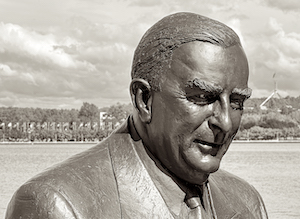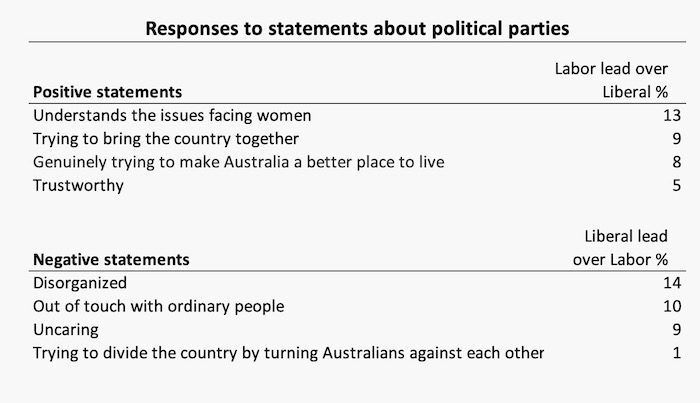Politics
The Voice
The Voice has all the elements to feed the media with a string of stories – speculation on Dutton’s security as party leader, disunity in the ranks of the Liberal Party, outrageous (but unsubstantiated) allegations of violence against children. Below are links to some of the (many) considered statements on the Voice that have appeared in the last week.
Paul Kilda, of the University of New South Wales, writing in The Conversation, adds to the views of other constitutional and legal experts in his contribution Why can’t we just establish the Voice to Parliament through legislation? A constitutional law expert explains. Constitutional enshrinement is a core aspect of the Uluru Statement from the Heart, and as experience with ATSIC demonstrates, bodies supported only by legislation have no guarantee of an ongoing life.
The same website has a link to 10 other questions on the Voice that readers have submitted to the Conversation editors, with answers from constitutional, legal and political experts.
The Sydney Morning Herald’s Anthony Galloway has a look at how members of the parliamentary Liberal Party are lining up: “Domino effect”: Liberal supporters of the Voice preparing formal Yes campaign. That campaign should kick off on May 15, once the proposed wording of the constitutional amendment is settled.
Trent Zimmerman, who lost his North Sydney seat to a teal in last year’s election, explains on ABC Breakfastwhy the parliamentary party’s hard “no” position is a poor political choice: Former Liberal MP Trent Zimmerman joins the Yes campaign. (9 minutes). He describes the Voice as a “modest proposal”. He is particularly concerned that in opposing the Voice, and in opposing strong action to deal with climate change, the party is not responding to the issues of concern to younger voters.
The latest fortnightly Essential Report, has a number of questions about the Voice:
- support for the Voice has slipped from a 65:35 level last August, to 60:40 now;
- that fall in support has been concentrated among Coalition voters, whose support has slipped from 53 percent to 41 percent;
- among voters aged 18-34 support is 77 percent, aged 35-54 it is 65 percent, aged 55+ it is 41 percent (confirming Zimmerman’s statement);
- although other surveys find support is weakest in Queensland, this survey finds support in all three of the largest states is between 56 and 59 percent;
- since February, the proportion describing themselves as “hard yes” has fallen from 38 percent to 32 percent, while the proportion describing themselves as “hard no” has risen from 21 percent to 26 percent;
- the dominant reasons people oppose the Voice are “It won’t make a real difference to the lives of ordinary Indigenous Australians” and “It will give Indigenous Australians rights and privileges that other Australians don’t have”;
- about half of respondents believe that Dutton’s opposition is simply a political tactic, while the other half believe he has genuine concerns.
Writing in The Conversation – Dutton’s “no” vote reflects 40 years of Coalition partisanship on the Voice – Alison Holland of Macquarie University puts the party’s position into historical perspective. She writes that “the Coalition has a long-held opposition to an empowered Indigenous advisory body, and Dutton is parroting a well-rehearsed Coalition songbook”.
Barry Prismall, former Deputy Editor of The Examiner (Launceston) and Liberal adviser, rather than engaging in arguments about the political economy of “practical outcomes” and issues around “executive government”, expresses his support in line with the spirit of the Uluru Statement. He sees it in terms of helping define our national identity. “Hopefully it will settle the great divide between our First Nations and colonial descendants”.
Not that it counts as a considered or articulate statement, but it’s informative to listen to Barnaby Joyce on ABC Breakfast The Voice affects “all Australians” (9 minutes). His is from an assimilationist viewpoint. His strong view, made from the outset of the interview, is that the Voice involves inserting a racial clause into our Constitution, which is quite inappropriate in 2023.
Joyce is on firm ground in opposing a racial clause. Our Constitution does have racial clauses (S25 and S51), but it was drafted in the late 19 th century, when the scientific refutation of the idea of “race” had not won wide acceptance.
But the Voice has nothing to do with “race”; it’s about the voice of “Aboriginal and Torres Strait Islander” people – the people who lived in this land, and were dispossessed and disrespected following an invasion in 1788. That’s what Joyce doesn’t understand.
Why is the Coalition losing support?
Is the electorate moving to the “left”, or are parties moving to the “right”?
Both are happening, according to the guests and callers on an ABC talkback show: Why are millennials less likely to vote conservative as they age?.
The guests are Ian McAllister of the ANU, one of the authors of the 2022 Australian Election Study, and Ann Pham, Women’s Director of the Young Liberals.
Drawing on the 2022 study, McAllister explains that until recently it was generally observed that as people aged, becoming members of the suburban bourgeoisie, their political support would shift to conservative parties. But there is no sign of that happening among “Millennials” (born between 1981 and 1996, the oldest of whom are now 42). Education is one explanatory factor: they are better-educated than earlier cohorts, and therefore more able to assess political propaganda critically. With more sources of information on which they can draw, they are less likely to follow their parents’ political leanings.

Ming – in touch with young Australians?
Also, as some callers asked, can the Liberal Party or the Coalition be called “conservative”? A theme common to many callers was that they might have been attracted to the Menzies or Fraser governments, but not to the later Coalition governments which moved closer to the radical right. Many callers introduced themselves with the statement “I used to vote Liberal, but …”.
One of McAllister’s strong points was to dispel the idea that “pocketbook” election pitches are effective. Few people are turned on by promises of special benefits for their group. Rather, in considering economic policy, people are likely to vote for the party that provides a better promise of national economic prosperity. That tallies with self-interest: the financially wealthy are more attracted to policies that they judge will allow their wealth to grow, rather than to political promises of immediate bribes. In this context he suggested that Labor’s policies on negative gearing and capital gains in the 2019 election didn’t go down well, not because they would have hurt the wealthy a little, but because Labor never explained how they would help the economy.
The whole session is 48 minutes. The preliminary discussion, before callers come in, runs for the first 9 minutes. Over the rest of the session there are some insightful comments from McAllister and Pham in response to callers.
Opinion polling: bad news and worse news for the Coalition
The Sydney Morning Herald reports on a disastrous poll for the Liberal Party and Peter Dutton. The Coalition vote is at 28 percent (36 percent in the 2022 election), and Labor’s is at 42 percent (33 percent in 2022). Dutton’s net personal approval is minus 28 percent, down from minus 11 percent last month, while Albanese’s net approval has risen from 24 to 27 percent. These results are more favourable to Labor than the Essential Poll, which shows primary support of 34 percent for Labor and 31 percent for the Coalition, and which has Albanese’s approval down a little, but he is still well ahead of Dutton.
The Essential poll surveys people’s responses to eight statements, asking how they describe their opinions on the two main parties. Because Essential’s graphical responses are hard to follow (positive and negative attributes are bundled together), I have rearranged the responses in a table, showing the differences in people’s evaluations.

The Coalition is ahead in all the wrong attributes.
In view of Dutton’s abysmal personal polling, there is a risk that he will become the next scapegoat for the party’s electoral failures. Morrison was the scapegoat for the 2022 electron result: with continuing poor electoral performance it is now Dutton’s turn.
Scapegoating, with its focus on the “leader”, provides an easy way for all others in the party to avoid engaging in the hard work of reform. For political parties this may mean re-examining basic policies, abandoning shibboleths (“small government” for example), and letting go of some long-held alliances (the National Party comes to mind).
Malcolm Turnbull’s warning to Americans
Unfortunately the defamation case Dominion Voting Systems brought against Fox News has been settled without going to a full trial. The settlement is substantial – $US788 million – but Fox will be spared the embarrassment of a string of witnesses exposing its practices.
You can see Malcolm Turnbull on MSNBC warning Americans that “no individual alive has done more to divide America than Murdoch” . The 11-minute YouTube video starts with some background to the case, a description of Murdoch’s “chaotic poison”, and some choice Fox extracts.
Turnbull has a podcast Defending Democracy with Malcolm Turnbull. The most recent entry is about Georgia’s Secretary of State Brad Raffensperger who took the phone call from Donald Trump in which he repeatedly urged Raffensperger to alter the outcome of the 2020 presidential vote.
How Chinese-Australians see Australia and the world
The Lowy Institute has produced its third report of Chinese-Australians’ attitudes: Being Chinese in Australia: public opinion in Chinese Communities. By and large it is the story of any immigrant community that has successfully settled in a new country, as their attachment to that country grows.

Little Bourke Street
On some political attitudes Chinese Australians have different attitudes to other Australians. They are less trusting of the UK, Japan and India, but understandably are more trusting of China, and are less likely to see China as a security threat to Australia.
Domestically they trust Albanese more than they trust Dutton. That goes against an assumption that because Chinese Australians are heavily represented in small business, they are naturally drawn to the Coalition. On national security they are much less enthused about AUKUS than other Australians, and they are less likely to see the US Alliance as crucial to our security.